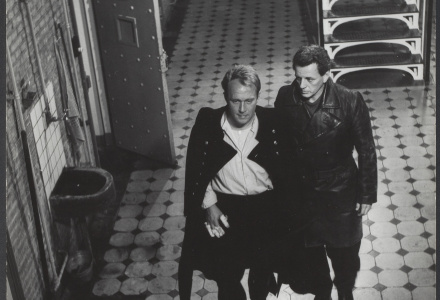Kees Brusse: Underacting Does It
After De dijk is dicht, Kees Brusse’s second major role in a Dutch feature film was in Ciske de Rat. Brusse’s acting was ‘small’ and modest. He spoke quietly, almost mumbling, and he moved naturally, without the stiff, mannered style that characterised much Dutch acting at the time. This type of acting was at odds with the bombastic tradition prevalent at the time in which pompous actors loftily and loudly declaimed their lines. With his ‘underacting’, Brusse showed the Netherlands that there was another way.
Internalised Acting
Brusse was heavily influenced by his teacher Cor van der Lugt Melsert. A stage actor and director, Van der Lugt Melsert propagated an ‘internalised’ way of acting in which the actor’s restraint calls upon the viewer’s active involvement in a natural way, thereby making room for an emotional reaction. Additionally, Van der Lugt Meltsert felt that a scene’s atmosphere was more important than how the lines of a script were recited – to him, how an actor spoke was more important than what was actually said, or if every word was clearly articulated.
With these principles from Van der Lugt Meltsert in mind, Brusse aired his criticism about Dutch film: ‘Everyone in our country always wants to hear everything. It’s such a disadvantage in Dutch film that everything’s got to be so explicit. Nothing’s left to the imagination – it’s all so well-trained and therefore soulless’.
In Kermis in de regen, the first and only feature film that Brusse would direct, he had the chance to show how he thought things should be done. Rarely has a director allowed his actors to speak so intentionally sloppy and unintelligibly as in Kermis in de regen. Just like Brusse wanted, the actors talk while smoking cigars, eating chips or with a finger in their mouths. As an inside joke, the actors regularly ask each other ‘What did you say?’, without waiting for an answer, because they already know more or less what the other said. The atmosphere and the realism were more important to Brusse than the literal text.
Act Natural
The film press reacted enthusiastically to Brusse’s ‘new’ acting and hoped that this new method would bring new élan to Dutch film. At the same time, the critics turned away en masse from the ‘old’ way of acting. They lashed out as never before at Brusse’s colleagues: ‘In general…their acting is on the average to dismal side.’ Their acting was ‘stupid and childish’ and the actors limited themselves to ‘acting unnaturally’. ‘When the big actors make their entrance, naturalism flees’. Brusse changed acting in the Netherlands once and for all.
more information
If you are looking for more material from our collection, please contact Film Sales:
sales@eyefilm.nl
phone +31 (0)20 5891 426
